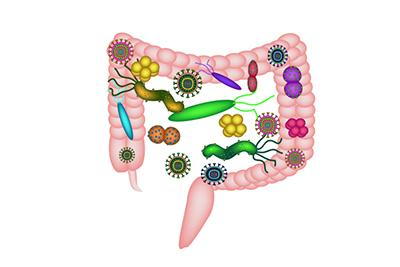
Camille Dillard, DO, MPH 25 May 2024
What is Dysbiosis?
Breaking down the word dysbiosis into its components; “dys”, meaning bad, biosis with includes the word “bio” meaning life, and “-sis” meaning state or condition. [1]
So, rejoining the components, dysbiosis is the state of bad life specifically within the flora of the
gastrointestinal system, which includes the entire tract from the mouth to the rectum.
Dysbiosis, first appears in writing in modern times in Elliot E. Furney’s book, “Culture, A Modern Methods, 22 Sept 1890. The context of the use of the word on page 23 of the book, dysbiosis was in reference to cultivating desired attributes in horticulture and potentially in human behavior.
Dysbiosis was defined as “difficult living”.
The modern-day definition of dysbiosis is the presence of pathogens in our intestines that activate or is associated with certain disease states. [2]
Dysbiosis is not a root cause. The bad pathogens, organism or “bugs” are not solely responsible for causing disease. Diseases are typically caused by several factors. Disease arises from the coalescing of several factors. Disease is the result of the “perfect storm” of risk factors; from environmental, lifestyle, and genetic factors.
In Public Health, we have the famous triad; vector or the carrier like the deer tick on Lyme’s disease, the agent, the “bad bug”, the virus, bacteria, toxin, allergen and the host, the genetic factors, lifestyle, immune system, etc.
While we are unlocking the genetic sequence of the human microbiome, let us also remember the factors that can have a daily, small, and direct effect on the microbiome.
What Has Changed Human Dysbiosis?
The first concept we must understand is ecology which is the study of the interaction of the gut with its environment; the foods we ingest, digest, assimilate and excrete. Foods we grow, cultivate, harvest, prepare, chew, swallow, break down, and poop affect the environment of our gut and our health.
There is an old saying, “Garbage in, garbage out”. [4] The basic elements of agricultural growth are water, soil, and atmosphere. Unfortunately, we do not give much consideration to the condition of the soil. We do not understand the essential role of preserving the boundless number of organisms within the soil that provide the soil’s nutritional content. We do not give much thought to maintaining the integrity of our water sources that must supply and sustain our foods and us. We do not fully appreciate what we emit into our air effects temperature, moisture content, weather patterns, etc. essential to create the environment for a healthy, adequate food chain. [5]
Ignorance is costly. The dumping of all the “-cides”, fungicides, herbicides, insecticides, pesticides, etc. has greatly diminished, if not eliminated, the organisms essential for living soil. Living soil often means nutrient-dense soil. The use of “-cides” for a misguided sense of beauty and peace has reduced our food to “garbage”. Hence, we eat garbage, nutrient-poor foods. Nutrient-poor foods lead to poverty of health, illness. The same process applies to our ignorance of proper handling of water sources and contamination of our air. [6]
Studies have shown that the loss of soil biodiversity of organisms has greatly diminished the number of good organisms for our GI tract. Loss of soil biodiversity has led to the marked increase in diseases that can be traced back to loss of healthy organisms in our GI tract.
The short list includes: [3]
- Auto-immune diseases (lupus, Hashimoto’s, Sjogren’s, etc.)
- Thyroid disease (overactive, underactive thyroid, thyroiditis, etc.)
- Inflammatory bowel diseases (colitis, Crohn’s, ulcerative colitis, etc.)
- Constipation
- Arthritis
- Depression
- Anxiety
- Autistic Spectrum Disorders
- Diabetes
- Allergies
You can make a difference at your house.
Eliminate the “-cides”. If you do not understand the ingredients listed on the ingredient label, there is a high probability that you do not know what you are putting on your property, foods, and flowers. We live in a time where we can access the knowledge of healthy agricultural practices.
Raise your own food or partner with someone who uses healthy agricultural practices. This will often mean getting to know and support your local farmer. Contrary to the characterization of prior eras, farming remains one of the most important occupations in all societies. Raising your food requires you to have access to nutrient-dense soil, not necessarily a plot of land. You can make your own containers that can fit in your living space.
I have intentionally ignored hydroponic agriculture, because soil is still required to deliver the essential elements to our food.
Connect with your friends, neighbors, and family members to form a group to encourage each other to grow your own food. You can exchange ideas and spend time helping each other to grow nutrient- dense food.
The biggest benefit in raising your own food is you save money!
Heal your gut and your soil.
Here are some resources to get started on cultivating a healthy gut:
- Torino S. The 8 Best Organic Seed Company. https://www.treehugger.com/best-organic- seed-companies-5190043
- Robbins O. https://foodrevolution.org/
- Organic Farmers Association https://organicfarmersassociation.org/who-we-are/
- Organic Food Education https://www.cornucopia.org/
References
- Etymonline. Dysbiosis. Accessed 18 May 2024
- Hooks KB, O’Malley MA. Dysbiosis and Its Discontents. 2017 Sept-Oct; 8(5): e01492-17.
- Hrncir T. Gut Microbiotia Dysbiosis: Triggers, Consequences, Diagnosis and Therapeutic
Options. Microorganisms, 2022 Mar 7;10(3):578.
- The Times, Hammond, Indiana. Work With New Electronic ‘Brains” Opens Filed for Army Math Experts, p. 65, Sun., 10 Nov 1957.
- Blum WEH, Zechmeister-Boltenstern S, Keiblinger KM. Review: Does Soil Contribute to the Human Gut Microbiome? 2019 July 8;7090287. Microorganisms.
- Kelvin L, Bihan M, Yooseph S, Methe BA. Analysis of the Microbial Diversity across the Human Microbiome. J. Craig Venter Institute, Rockville MD, USA, PlosOne 7(6): e32118.